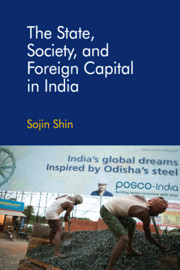Book contents
- Frontmatter
- Dedication
- Contents
- List of Tables, Figures, Illustrations, and Maps
- Acknowledgements
- 1 Introduction
- 2 FDI Inflows in India: Ideas, Interests, and Institutional Change
- 3 FDI Inflows in Tamil Nadu: Inclusionary Ideas, Weakened Interests, and Incremental Institutional Change
- 4 Making FDI Work in Tamil Nadu
- 5 FDI Inflows in Odisha: Weakened Ideas, Strong Interests, and Unstable Institutional Change
- 6 Making FDI Work in Odisha?
- 7 Conclusion
- Bibliography
- Index
3 - FDI Inflows in Tamil Nadu: Inclusionary Ideas, Weakened Interests, and Incremental Institutional Change
Published online by Cambridge University Press: 08 July 2018
- Frontmatter
- Dedication
- Contents
- List of Tables, Figures, Illustrations, and Maps
- Acknowledgements
- 1 Introduction
- 2 FDI Inflows in India: Ideas, Interests, and Institutional Change
- 3 FDI Inflows in Tamil Nadu: Inclusionary Ideas, Weakened Interests, and Incremental Institutional Change
- 4 Making FDI Work in Tamil Nadu
- 5 FDI Inflows in Odisha: Weakened Ideas, Strong Interests, and Unstable Institutional Change
- 6 Making FDI Work in Odisha?
- 7 Conclusion
- Bibliography
- Index
Summary
The very success of the developmental state in structuring the accumulation of industrial capital has changed the nature of relations between capital and the state.
Tamil Nadu is the most urbanised state in India with 48.45 per cent of its population living in urban areas. The highest level of urbanisation is commensurate with the state's commitment to industrialisation. The state's aggressive land acquisition for industrialisation supports it. As of June in 2017, Tamil Nadu has the largest number of 36 operational Special Economic Zones (SEZs) among many provincial states in India. Building SEZs primarily aims at promoting growth and productive capacity through a massive flow of foreign and domestic investment in the SEZs, particularly in infrastructure. It is also expected to generate additional economic activities like the creation of employment opportunities. Such aims are clearly stipulated in the Tamil Nadu's Industrial Policy 2007, which promotes manufacturing capacity to meet global manufacturing competence.
As such, the higher level of land acquisition in Tamil Nadu poses a question of ‘how’, particularly in its relations with socio–political facilitators, compared with other states that have struggled with land management for industrialisation. How do socio–political factors explain a high level of land acquisition that is coupled with intensive industrialisation in Tamil Nadu? This chapter attempts to answer the question by paying attention to the ideas of policy-makers on inclusive industrial schemes and societal structure presenting the upward mobility of low caste groups in the state. I argue that the state's commitment to making industries by aggressively making industrial lands has met the aspirations and needs of citizens favouring urbanisation, thereby contributing to industrial development. Also, the social inclusion, which has a significant role of managing social conflicts, could help the state garner legitimacy to pursue state goals for industrialisation.
This chapter considers the Madras legislative assembly election in 1967 as a critical event after which bipartisan rule began with two Dravidian regional parties, Dravida Munnetra Kazhagam (DMK) and All India Anna Dravida Munnetra Kazhagam (AIADMK). During the bipartisan rule, political elites could consistently pursue industrialisation with limited intervention from other parties. The leaders recognised FDI inflows as significant financial resources and advanced ideas favouring foreign capital. In addition, they have also implemented various schemes for social inclusion of the broader strata of citizens, such as land reforms, public distribution, education, health services, and employment in parallel with industrialisation.
- Type
- Chapter
- Information
- The State, Society, and Foreign Capital in India , pp. 50 - 78Publisher: Cambridge University PressPrint publication year: 2018

